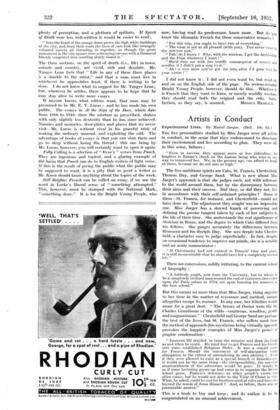Artists in Conduct
Experimental Lives. By Muriel Jaeger. (Bell. 10s. 6d.) THE five personalities studied by Miss Jaeger were all artists in conduct, in the sense that they endeavoured to dominate their environment and live according to plan. They were all, in this sense, failures : "Even in success, they appear more or less ridiculous, for laughter is Nature's check on the human being who tries in any way to transcend her. We, in the present age, can afford to laugh at them, because we do not aim so high."
The five ambitious spirits are Cato, St. Francis, Chesterfield, Thomas Day, and George Sand. What is new about Miss
Jaeger's approach is that she judges each, not with reference to the world around them, but by the discrepancy between their aims and their success. Did they, or did they not, live
in accordance with their self-ordained principles ? Some of them—St. Francis, for instance, and Chesterfield—could not have done so. The adjustment they sought was an impossible one. Miss Jaeger has a shrewd knack of perceiving and defining the precise tangent taken by each of her subjects to
the life of their time. She understands the real significance of
Stoicism in Rome, and the degree to which Cato differed from his fellows. She gauges accurately the differences between Rousseau and his disciple Day. She sees deeply into Chester- field, a character easy to judge superficially. In fact, despite an occasional tendency to improve our minds, she is a sensible and an acute commentator :
"If Christianity had not existed in Francis' time and place, it is still inconceivable that he should have led a completely normal life."
There are concessions, mildly irritating, to the current school of biography : "A lubberly youth, new from the University, but to whom to be a completely civilized man seemed the end of existence, descended upon the Paris salons in 1714, set upon learning his manners in the best school."
But this means no more than that Miss Jaeger, rising superior to her time in the matter of reverence and method, cannot altogether escape its manner. In any case, her felicities would atone for a great deal. "The heroes of Ossian were the Sir Charles Grandisons of the wilds—courteous, sensitive, gentle and magnanimous." ' Chesterfield and George Sand are perhaps the best of the lives, but St. Francis, who suffers most from the method of approach (his mysticism being virtually ignored) provokes the happiest examples of Miss Jaeger's power of graphic condensation : "Innocent III decided to tame the monster and draw its fangs as and when he could. He tried first to get Francis and his friends into SOMo established Religious Order. It was a crucial point for Francis. Should the movement of self-abnegation earrY abnegation to the extent of surrendering its own identity ? Even if they were allowed to exist as a special branch of Benedictines, it would not be the same thing—the irresponsibility, the essential amateurishness of the adventure would be gone. It would he as if some hectoring grown-up had come in to organize the Desert Island game. Francis's deference to other people's views was often comic, but he would not defer to the Vicar of Christ in this. What, he asked, could he and his brothers need of rules and formulog beyond the words of Jesus Himself ? And, as before, there was no presentable answer."
This is a book to buy and keep ; and Its author is to be congratulated on an unusual achievement.






























 Previous page
Previous page